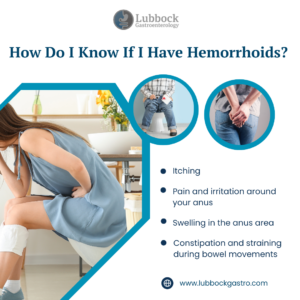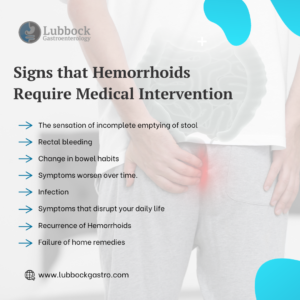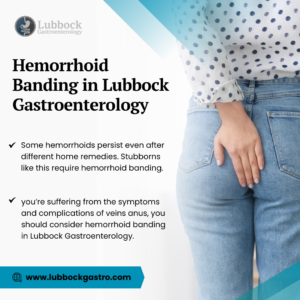Hemorrhoids in Lubbock, TX
Hemorrhoids are self-diagnosable and can be treated effectively with home remedies. However, there are cases where medical intervention is required.
Read on to find out the signs that your lower rectum needs medical intervention.
When is it time to seek medical care for hemorrhoids?
Most hemorrhoids resolve within a week. If the lower rectum persists longer than a week, then it’s time you seek medical care. There are also signs that you observe when you’re battling with hemorrhoids that indicate that your hemorrhoids require medical intervention.
For instance, when you have persistent discomfort, pain, or itching for a week, the bleeding won’t stop, and you’re starting to feel dizzy.
How Do I Know If I Have Hemorrhoids?

How Do I Know If I Have Hemorrhoids
Generally, the symptoms can vary from person to person. The common symptoms you can watch out for include:
- Itching
- Bright red blood in your stool, on the toilet paper you use, or in your toilet bowl
- Pain and irritation around your anus
- Swelling in the anus area
- Constipation and straining during bowel movements
Six Self-help Tips for Hemorrhoid Flare-ups
Off-the-shelf hemorrhoid remedies
Many over-the-counter products are available to help with the lower rectum. You can also ask your doctor about prescription preparations, which contain more potent anti-inflammatory drugs and numbing medications.
Increase your fiber consumption.
The most crucial self-help tip is to add fiber to your diet. This is best done with foods that contain high fiber. Eat plenty of fresh vegetables, fruits, and fibrous starches to give your body the fiber it needs to create a soft stool that still holds its shape. They help hemorrhoids a lot. You can also opt for a fiber supplement to get 20 to 30 grams of fiber per day.
Sit in a sitz
The relief offered by sitz baths shouldn’t be underestimated. Using a basin that fits under the toilet seat, soak the inflamed area in warm water for 10 to 15 minutes, two to three times a day, which can help flare.
Stay hydrated
Drink lots of fluids to stay well hydrated and keep stools soft so they’re easier to pass. Drink plenty of water throughout the day. Avoid unnecessary liquid diets and go for liquids like prune juice, a natural that can help with hemorrhoid flare-ups.
Ice it
Put a small cold pack on the painful spot several times daily. A cold compress helps with swelling and pain.
Maintain a good posture.
Sit up straight and maintain an excellent posture to increase the health of all of your organs, including your bowels. When you’re on the toilet, don’t slouch down or collapse in your middle. Let your back be straight to help you keep your rectum and anal canal angled straight for easy excretion.
10 Signs that Hemorrhoids Require Medical Intervention

Signs that Hemorrhoids Require Medical Intervention
The sensation of incomplete emptying of stool
Prolapsing internal hemorrhoids can cause the feeling that your stool is stuck in the anus. Or you may notice a mucous discharge and difficulty cleaning yourself following a bowel movement. This is a sign to seek medical intervention.
Rectal bleeding
Bleeding must not be ignored when it comes to hemorrhoids. Rectal bleeding may be a sign of a more serious gastrointestinal condition such as colon cancer or inflammatory bowel disease than the hemorrhoids itself. Consult a professional immediately if you notice rectal bleeding.
Discomfort from hemorrhoids that persists for longer than a week
If you’ve had persistent discomfort, pain, or itching for a week. Most of the symptoms of hemorrhoids should resolve within a week, and if they don’t, contact your physician.
Change in bowel habits
It is associated with changes in bowel habits that can only be effectively treated by a health professional. The lower rectum can interfere with bowel movements as they become more prominent and affect the usual bowel habits.
Symptoms worsen over time.
While many home remedies may temporarily relieve inflammation, pain, or discomfort, they don’t necessarily cure the issue. However, if your symptoms worsen even with home remedies, it’s time to seek medical intervention.
Infection
It can become infected, worsening discomfort and other complications. Signs of infected hemorrhoids include fever, swelling, and unusual discharge. If you suspect your veins anus may be infected, you need to seek medical intervention.
Symptoms that disrupt your daily life
If your hemorrhoids make it difficult for you to sit or have a bowel movement, it’s time to seek medical intervention. Your healthcare provider can help improve your veins anus and alleviate your discomfort so you can continue your daily activities.
If you suspect your discomfort may be caused by something other than hemorrhoids,
When you have bleeding, discomfort, or pain in the anal area, it could indicate an inflamed hemorrhoid or something else entirely, so see a doctor for an accurate diagnosis.
Recurrence of Hemorrhoids
If you keep experiencing veins anus often such that even after treating one recently at home, you observe symptoms of veins anus again in no time. It’s better to seek medical assistance. This way, you can treat the underlying cause and prevent recurring symptoms.
Failure of home remedies
A sign that you need to seek medical intervention for your hemorrhoids is when home remedies fail to relieve its symptoms. Avoid wasting your time and living in discomfort by visiting your doctor for proper treatment.
Are Hemorrhoids a Warning Sign of Anal Cancer?
While hemorrhoids and colon or anal cancer can cause similar symptoms, such as rectal bleeding or lumps in the anus, hemorrhoids are not usually a precursor to cancer. These symptoms should still be promptly brought to the attention of a physician to help determine the cause and provide an accurate diagnosis and appropriate treatment.
What are external and internal hemorrhoids?
External hemorrhoids are seen in the anal region and often cause pain and bleeding with bowel movements. Because externals are exposed to external friction, they can become itchy, irritated, and painful with routine activities such as sitting or walking. On the other hand, internal in the rectum aren’t usually visible and don’t typically cause discomfort like external.
When should you go to the doctor for hemorrhoids?
You should see your doctor if it doesn’t resolve within a week or result in bleeding.
How do doctors diagnose hemorrhoids?
The doctor will review your medical history and your symptoms, as well as examine you to make a diagnosis. While externals are evident during physical examination, diagnosing internal hemorrhoids might require a digital rectal exam of the anal canal and rectum and visual inspection such as sigmoidoscopy.
With digital rectal examination, the doctor inserts a gloved, lubricated finger into your rectum. This allows your provider to check for anything unusual, such as growth. With visual inspection, an anoscope or proctoscope is used to view the internal lining of the rectum and anus.
What are the grades of internal hemorrhoids?
Internal hemorrhoids have grades, and the grades include:
Grade 1: Prominent hemorrhoidal vessels, no prolapse.
Grade 2: Prolapsed with Valsalva maneuver; spontaneously reduces.
Grade 3: Prolapsed with Valsalva maneuver; manual reduction is required.
Grade 4: Chronically prolapsed; manual reduction is ineffective.
What happens if you leave a hemorrhoid untreated?
Hemorrhoids often bleed during bowel movements, and untreated bleeding can become more frequent and severe. Excessive bleeding can result in anemia, characterized by easy fatigability and shortness of breath.
Why do hemorrhoids happen?
Hemorrhoids occur for various reasons. It could be genetic, as some people inherit a tendency to develop them, and it can also occur after chronic diarrhea. It is mainly caused by factors that result in increased pressure on the walls of the vessels in the lower rectum and anal region, such as chronic constipation, sitting for too long, eating low-fiber foods, and heavy lifting.
Are hemorrhoids a severe problem?
No, hemorrhoids aren’t severe but can be quite uncomfortable and unpleasant and should be treated as soon as possible.
What is the early stage of hemorrhoids?
Early stages of hemorrhoids are physically present as a slight protrusion from the anus that can be seen and touched during bowel movements.
Who usually gets hemorrhoids?
Women usually get during pregnancy and childbirth. You can also get hemorrhoids if you have a family history, often strain during bowel movements, or have long-term (chronic) constipation or diarrhea.
What size do hemorrhoids need surgery?
Grade 3 or grade 4 hemorrhoids require surgery.
Can hemorrhoids block poop?
Yes, It can block poop in some cases, further worsening constipation.
Is it OK to have hemorrhoids for years?
No, it’s not okay to have hemorrhoids for years. Seek medical intervention if your veins anus persist such that you feel like they won’t go away.
Hemorrhoid Banding in Lubbock Gastroenterology

Hemorrhoid Banding in Lubbock Gastroenterology
Some hemorrhoids persist even after different home remedies. Stubborns like this require hemorrhoid banding.
Hemorrhoid banding is a minimally invasive procedure involving the use of rubber bands to obstruct the blood flow to the hemorrhoids.
If you’re in Lubbock and you’re suffering from the symptoms and complications of veins anus, you should consider hemorrhoid banding in Lubbock Gastroenterology. One of the best clinics to get it done at Lubbock is Lubbock Gastroenterology, founded by Dr. Sameer Islam.
Dr. Sameer Islam is a gastroenterologist with many years of experience in Lubbock, TX. He can help you relieve all the symptoms of hemorrhoids disrupting your daily activities.
Schedule an appointment with Dr. Islam for hemorrhoid banding in Lubbock, TX.
